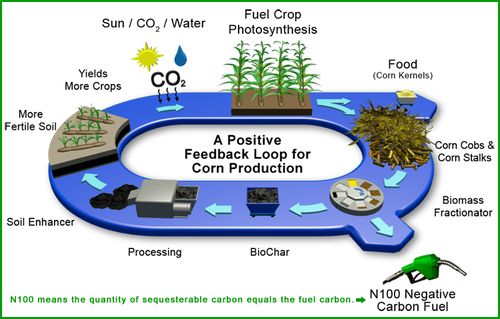Biochar is pure carbon formed by the controlled burning of biomass at anywhere from 300-900 degrees centigrade.
It sounds nasty, and the process is a bit like an oil refinery. But in a controlled process you get both natural gas, fuel that can be transformed into gasoline or diesel fuel, along with a soil additive that can hold carbon in the soil and improve crop yields.
The process has been found to occur naturally in the Amazon, where a layer of “terra preta” or black Earth, holds soil together to enable farming on very poor soil. Terra preta, unfortunately, released its gas into the atmosphere. A conference on the biochar concept was held in Colorado two years ago.
By burning the fuel in a controlled environment, and decomposing the result in the absence of oxygen, the idea is you create a positive feedback loop. Giving a little to cows can even reduce flatulence, i.e. methane production, reducing global warming further. You can also burn biochar as a fuel like charcoal.
The face is now on to turn this idea into an industry. A chart from the International Biochar Initiative shows that most feedstocks deliver major environmental improvements – and even its use for municipal garbage saves on disposal costs.
The challenge here is to turn the process into a product. Cool Planet is working to create a “transportable” biowaste disposal plant, which could process plant or forest waste in-season and then be moved to another location. Biochar Solutions wants to build even-smaller systems, which can be hauled about behind a truck, to process biomass close to its source.
All this is a few years from turning into something an ordinary person can invest in, but it's just one example of how people are turning the “climate crisis” into business opportunity. If Al Gore had focused on the opportunities of climate renewal rather than the dangers of climate change 12 years ago, maybe this planet wouldn't be in the trouble it's in.
But better late than never.










